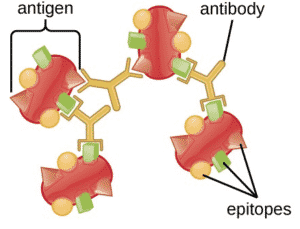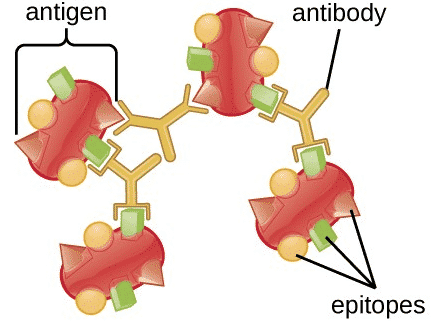Antibodies are Y-shaped proteins that are produced by B cells of our immune system to specifically recognize and bind antigens. Antigens are molecules that instigate antibody production and can be from an invading pathogen or from our own body. Each antibody recognizes a specific antigen creating a repertoire of millions of distinct antibodies that can neutralize invaders or attack our own body’s proteins.
 Characterizing our repertoire of antibodies – in other words figuring out all the different types of antigens our antibodies can bind to – will provide information on protective and pathogenic immunity in ME/CFS and FM.
Characterizing our repertoire of antibodies – in other words figuring out all the different types of antigens our antibodies can bind to – will provide information on protective and pathogenic immunity in ME/CFS and FM.
This information will be potentially useful for diagnosis, identifying disease subgroups and describing the disease course for ME/CFS and FM.
Earlier this year the Bateman Horne Center partnered with Serimmune, Inc to begin to characterize the ME/CFS and FM antibody repertoire. Our aim in this partnership is to identify novel antibody biomarkers and to determine the immune histories of ME/CFS and FM patients compared to healthy controls. BHC provided blood from 150 ME/CFS, FM and healthy controls from our biobank of clinically-characterized samples. Serimmune began analyzing the blood using their platform dubbed SERA (Serum Epitope Repertoire Analysis). Here’s how SERA works. The blood sample is mixed with special bacteria that have been made to express specific antigens on their surface. If there are antibodies in the blood that recognize the displayed antigens, the antibody binds to the bacteria and the complex is separated out. The antigen is sequenced and the differences in antibody repertoire between ME/CFS, FM and healthy controls are determined.
Six months after providing Serimmune with the samples, the preliminary results are in and are interesting!
The analysis identified a set of antibody species that occur more often in patients with ME/CFS and FM than in healthy controls. Through this analysis we aim to map antigens back to particular organisms in the environment that may give rise to these antibodies in some ME/CFS and FM patients.
This preliminary result was intriguing enough that the next batch of 150 blood samples was sent to Serimmune last week to confirm these results as well as expand the number of antigens that are recognized. We hope to publish these results in early 2019.
If this content has been useful to you or a loved one, we invite you to explore our online library, read our blog, and subscribe to our monthly newsletter. We thank you for your continued support as we press forward in our vision to create a world where patients with ME/CFS and FM are readily diagnosed, effectively treated, and widely met with empathy and understanding.
Please consider making a donation to BHC a 501 (c)3 nonprofit organization today.

 Lucinda Bateman, MD, is a renowned clinician, researcher, and educator. Her Johns Hopkins University Medical School training instilled an approach to care that she has employed throughout her career - the patient comes first and the unknown or unexplained does not equate to a lack of proper and compassionate care. Since starting her own practice in 2000, she has served on six boards or committees, been the principal investigator for 45 studies, authored/coauthored 40 journal articles, served as adjunct instructor and adjunct assistant professor in the University of Utah Departments of Preventative Medicine, Internal Medicine, and Anesthesiology, and lectured around the world.
Lucinda Bateman, MD, is a renowned clinician, researcher, and educator. Her Johns Hopkins University Medical School training instilled an approach to care that she has employed throughout her career - the patient comes first and the unknown or unexplained does not equate to a lack of proper and compassionate care. Since starting her own practice in 2000, she has served on six boards or committees, been the principal investigator for 45 studies, authored/coauthored 40 journal articles, served as adjunct instructor and adjunct assistant professor in the University of Utah Departments of Preventative Medicine, Internal Medicine, and Anesthesiology, and lectured around the world.